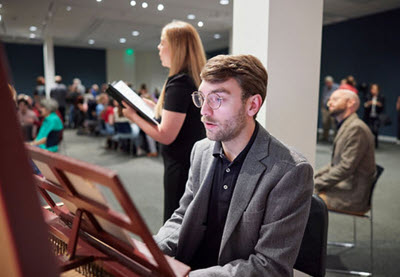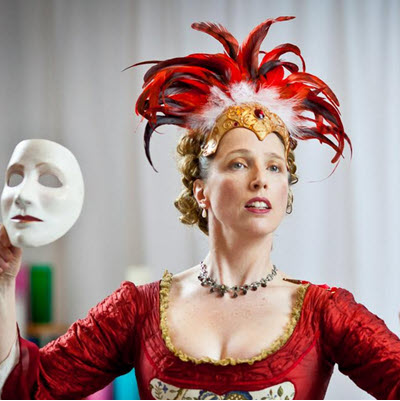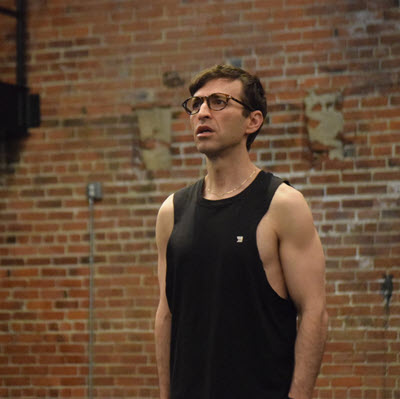by James Bash
Published January 29, 2024
In its U.S. premiere, Dinner with Handel dishes up a new pasticcio opera
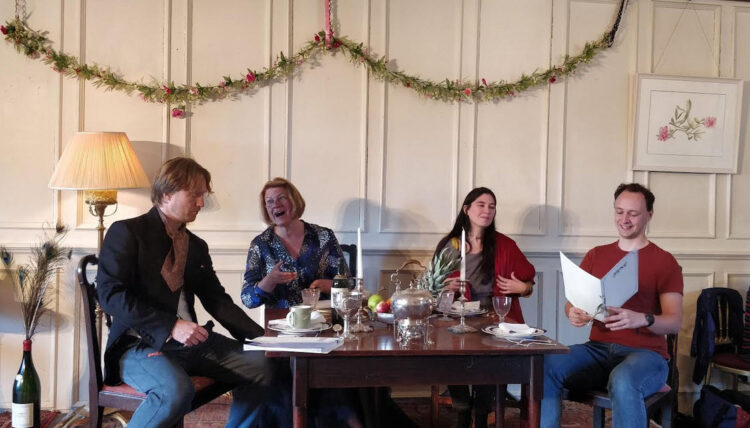
Today’s love of the jukebox musical and George Frideric Handel’s love of food provides the backdrop for Dinner with Handel, a pasticcio concocted by Julian Perkins and librettist Stephen Pettitt. Portland Baroque Orchestra will give the opera’s U.S. premiere in performances Feb. 10 and 11.
This staged chamber opera revolves around a surprise dinner party in the mid-1730s where Handel is confronted with certain people that he would much rather avoid. Over the course of about 90 minutes, concertgoers will be treated to a witty and often poignant story that interweaves the life of the composer with a mix of arias from his operas and oratorios as well as music from his contemporaries.
Leave it to the London-based Perkins, who is in his first year as artistic director of Portland Baroque Orchestra — the PBO’s 40th anniversary season — to serve up this unusual confection. The idea for a pasticcio originated with the director of the Handel & Hendrix House in London — two adjacent row houses on Brook Street where George Frideric and Jimi lived and now a museum and intimate performance space. Dinner with Handel was presented at the inaugural Handeliade, in Gloucestershire in 2021. As Perkins recalls, “Stephen had the idea of setting the piece as a dinner party.”
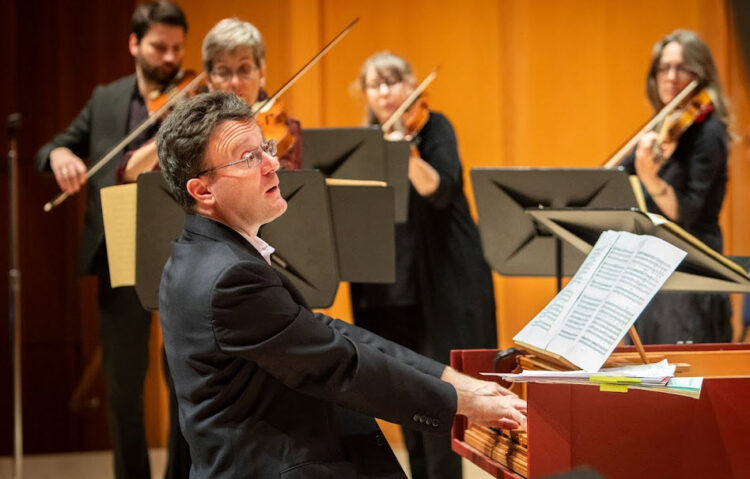
Although the scene is fictitious, Dinner with Handel involves people well-known to the composer. Gustavus Waltz, a singer who briefly lived with Handel and worked as his cook, uncorks a surprise dinner party. For the occasion, he invites Francesca Cuzzoni, the great soprano who premiered Cleopatra and Rodelinda, among other sublime heroines. By legend, Handel threatened to throw the diva out of his window for refusing to sing an aria that she thought too simple (“Falsa immagine” from Ottone became one of her biggest hits). Another thorn in Handel’s side is rival composer Johann Christoph Pepusch, whose own pasticcio, The Beggar’s Opera, had become wildly, alarmingly popular. As a foil to this pair is Handel’s longtime friend, Mary Pendarves Delany, famous for her botanical drawings and for inventing mixed-media collages she called “paper-mosaicks.”
The creative team assembled arias mainly by Handel, but also by Thomas Arne, Henry Purcell, and Antonio Vivaldi. Pettitt and Perkins put new texts to the familiar tunes, keeping the music’s original metric patterns. Perkins glued it all together with new recitatives that advance the plot.
This is not the first collaboration between Perkins and Pettitt. In 2016, they created a pasticcio, Casanova, commissioned by London’s Kings Place for its “Baroque Unwrapped” series. Featured on BBC Radio 3, that piece looked back on Casanova’s time as a professional violinist, portraying his circle of famous musicians, artists, and poets.
In Handel’s day, it was quite fashionable to attend a pasticcio at Covent Garden and other theaters. Today, jukebox musicals might rule on Broadway or London’s West End — creating a new storyline based on hits from one artist or one era — but pasticcios in the opera house largely fell out of fashion in the early 19th century. There have been one-off efforts in recent years, such as The Jewel Box from 1991 (music by Mozart) or the Metropolitan Opera’s 2012 production of The Enchanted Island (Handel, Rameau, Vivaldi). But operatic mash-ups remain few and far between.
“A pasticcio is literally a pie, a musical pie — a sort of catwalk of arias for singers,” explains Perkins. “This kind of show was usually more about the singers than the plot. The music selections strung together could be fairly random.” However, Dinner with Handel is more than just a collection of arias. The story reveals something of Handel’s personality and avoids placing him on a pedestal.
“Handel wasn’t always easy to get along with,” says Pettitt. “He had a certain arrogance. He wasn’t all sunlight and roses. He was a charismatic, larger-than-life character.” The audience will get a snapshot of Handel’s impetuousness.
“Almost everything in Dinner with Handel is loosely based on facts,” says Pettitt. “So I surmised, for example, the personality of the composer Johann Christoph Pepusch and his relationship with Handel. Pepusch’s The Beggar’s Opera in English [with a satirical libretto by John Gay] had a damaging effect on Handel’s Italian opera enterprise. We explore this rivalry in our pasticcio.”
Commercially, Pettitt continues, “we know that John Gay started his competing company to present ‘opera’ in the vernacular with simple tunes for the common people. These popular productions were in direct opposition to Handel’s ornate Italian operas that he was producing until the mid-1730s.” (As the late Christopher Hogwood observed, The Beggar’s Opera didn’t just snuff out Italian-language opera productions in London, it likely killed the development of serious English-language opera until the 20th century.)
“Handel was a businessman,” explains Pettitt. “All of the opera and theater companies operating in London were businesses and hard-nosed about the whole thing. In our pasticcio, each composer doesn’t see the other’s point of view very well and has to argue their corner, in a manner that boils up and explodes.” The display of sharp elbows between composers was a part of normal commerce during a time that was precarious for any creative endeavor.
Inhabiting the Music

For the Portland production, the role of Handel is assigned to a countertenor, which reflects the spirit of the times. Handel scholar Jonathan Keates pointed Perkins to a source that suggested Handel might have had a countertenor voice. Regardless, says Perkins, “the successful castrati were the opera superstars of their day. So it seemed only fitting to give Handel the slightly ethereal voice of the countertenor.”
In Portland, Handel will be sung by New York-based countertenor, Daniel Moody, who has performed the title roles in Giulio Cesare and Rinaldo, Arsamene in Xerxes, Lichas in Hercules, and Didymus in Theodora.
“I have done many of Handel’s operas, but he was such a prolific composer,” says Moody of the countless available roles and all-but-inexhaustible catalogue of music. “All of the arias in Dinner with Handel are new to me, and the text is in English. So this will be a wonderful undertaking. Handel was a genius, and he had a terrific way of elevating drama in his music, and that helps me to reveal his character.”
Handel famously elevated the art of (and directs his ire towards) Francesca Cuzzoni, who will be sung by Portland-based soprano Arwen Myers.
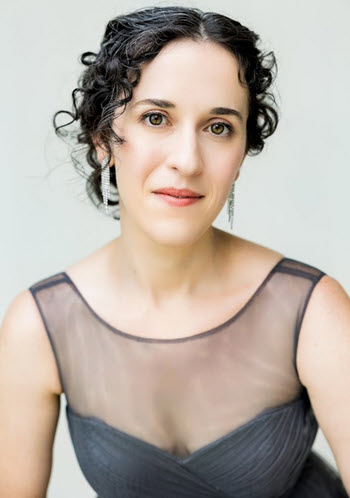
“Cuzzoni was quite a character, a real piece of work,” says Myers. “I’ve done some research on her. She thought highly of herself, but she deserved her notoriety, because she was an incredible singer. Still, she struggled with drinking and gambling. She got into fights with Handel and Faustina Bordoni, her rival. She was intense!” (Indeed, Cuzzoni’s fights with Bordoni, on-stage and off, were parodied in The Beggar’s Opera).
The real-life conflict between Handel and Cuzzoni highlighted an era where singers often got to dictate what they wanted.
“Apparently, right off the bat when she initially met Handel, she told him that she wasn’t going to sing an aria assigned to her role,” Myers explains. “What a way to kick off a relationship! She thought that the aria, which Handel had written for someone else, would not show off enough of her vocal ability. When she first came to London, it was a huge deal. All of her shows sold out, and ticket prices were sky-high. She was like the Taylor Swift of her time.”
Cuzzoni’s success and swagger in London took place during the years of Handel’s Royal Academy of Music. However, the company closed down after suffering severe financial losses. Handel quickly responded with the New or Second Royal Academy, which coincided more closely with the time represented in Dinner with Handel, when Cuzzoni was looking for work.
“The story that we are presenting is about human relationships,” says Perkins. “It’s not just about showing Handel as a successful impresario and swashbuckling figure, but also as a human being with vulnerabilities and an element of loneliness as well. So we see what we imagine to be the flaws in his character. He is a human being. He loses his temper. He feels repentant, insecure, regretful — just like we do.”
For Baroque ensembles looking to expand their repertoire, one of the advantages of Dinner with Handel is that its staging doesn’t require much in the way of scenery and props. A table, a few chairs, and something to suggest food suffices for the visual element. “Dinner with Handel is a digestible show,” notes Perkins. “While I love conducting full-blown operas, they are a cripplingly expensive medium.”
The chamber orchestra is also very tidy. The five singers are accompanied by an ensemble of 10 musicians: a string quartet, double bass, theorbo, harpsichord, two oboes doubling on recorders, and bassoon.
“The instrumentalists are the alter-egos of the singers,” notes Perkins. “We are partners in crime. If the singers ornament a phrase, we respond — not necessarily with the same ornament — but with the same energy. We are, quite literally, the stage band.”
Perhaps Dinner with Handel will finally spark a renaissance of pasticcios. There’s a plethora of glorious music and historic events to draw from. Finding the right combination of music and a story that will engage listeners is not easy, but Perkins and Pettitt’s new pasticcio style may resonate very well with today’s audiences.
“We are only doing unto them what they did to others,” Perkins points out. “Handel was a genius, no doubt about it. You need to be creative with his material in order to understand it better. If you understand the creative process, you can inhabit the music that much more. In doing so, we hope that our performances can come alive for audiences today.
James Bash is a freelance writer based in Portland, Oregon. His arts journalism has appeared in The Oregonian, The Columbian, Classical Voice North America, Opera, Opera Canada, and many other publications. He has also written for the Oregon Arts Commission and the Grove Dictionary of American Music, 2nd edition.

